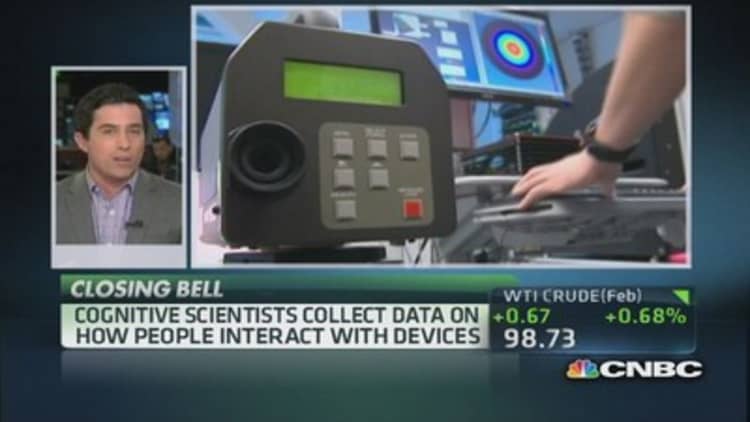
Big tech is getting serious about robotics.
Google just bought Boston Dynamics—the maker of the robots Cheetah and BigDog—Amazon is using robots in its warehouses, and robots play a key role in the manufacturing of Intel's chips.
But inside Intel's small robotics lab in Santa Clara, Calif., engineers and computer scientists are working to ensure a better smartphone, tablet and laptop experience better by making the devices more responsive to touch.
Intel is working with a variety of the world's biggest phone and computer manufacturers, as well as other consumer electronics companies, on making their products better. For proprietary and competitive reasons, Intel won't disclose any of the companies with which it is collaborating.
(Read more: Robots, self-driving cars—what's Google doing?)
The Intel robots are serving a specific purpose in this endeavor, lowering the cost of expensive focus groups and product testing with hundreds of beta users.
A group of cognitive psychologists craft a questionnaire for focus groups: How does your phone feel next to your ear? Do you like the swiping action on your tablet? Are you satisfied with your laptop's scrolling action?
After being crunched, the data from all those focus groups reside in the robot's computer memory. The robot does a number of tests on what people like and don't like about using their smart devices, conducting meticulous measurement and analysis of eye and hand movements.
(Read more: Game-playing robots and other cool stuff)
Oculus, from the Latin word for "eye," is a robot specializing in checking out the look and feel of the smartphone or tablet experience.
Matt Dunford, who works in Intel's robotic lab, says Oculus has its hands full and faces constantly evolving challenges.
"Consumers see their friends with a new device and feel like it's way better than the one they have," he said. "Now their expectations are up here, even though the device they own is down here."
(Read more: McDonald's: More than a trillion served, by robots)
Then there is Andy, also known as Auditus. This robot operates in a soundproof room within the lab, and which measures a phone's audio clarity. The lab is experimenting with how sound travels through the network to the phone and to the ear.
—By CNBC's Mark Berniker and Josh Lipton. Follow Mark on Twitter@markberniker and Josh @CNBCJosh.



